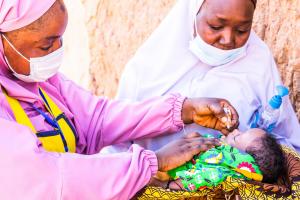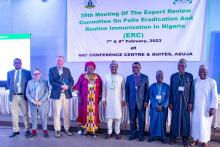Experts accede to Nigeria’s progress, highlight areas of focus for maintaining polio-free status
The 39th Expert Review Committee (ERC) for Polio Eradication and Routine Immunization has expressed optimism that the Nigerian programme is on course to stop the transmission of the circulating Variant Polio Virus (cVPV2) with ‘impressive progress’ recorded.
The ERC meets periodically to evaluate progress toward the attainment of a polio-free Nigeria. The monitoring body comprising global and local experts on polio eradication guides the government and partners on how they can interrupt the residual risk of all forms of poliovirus and boost routine immunization in the country.
At the end of the 2-day meeting (07-08 February, 2022) , the ERC commended Nigeria. “Everyone has demonstrated commitment and leadership towards quality coverage. For the past 5-weeks, we have not recorded any cVPV2. If we continue this trajectory then the end of cVDPV2 is in sight," says Prof. Akin Osibogun, the Chairman of ERC’.
Recall that Nigeria was declared wild poliovirus free in 2020. However, the circulating Variant Polio Virus2 (cVPV2) strain transmission continues. In 2022 alone, Nigeria reported 168 case.
To further strengthen the fight against cVPV2, the Coordinator for Polio Eradication Programme from the WHO Regional Office for Africa, Dr Jamal Ahmed, says that work is still cut out for the country in the northwest zone which has persistently presented with breakthrough transmission of cVPV2 cases despite several rounds of novel Oral Polio Vaccines type 2 (nOPV2)
The Experts further appreciated the strong progress in the country and emphasized that there is a consensus among both the local and international partners that Nigeria can interrupt the transmission of cVPV2 by December 2023.
Dr Jamal stressed that Nigeria is implementing a robust plan till the month of august and by the second half of the year there should be minimal cases recorded.
“The ERC agrees that the work is cut out for us in Zamfara and Sokoto States to stop the transmission of the virus. Due to the contextual challenges and epidemiology of the region, it will require deliberate effort from the government at all levels and partners to achieve the desired result,” he says.
Dr Jamal buttressed that the Global Polio Eradication Initiative (GPEI) is also committed to supporting Nigeria to attain cVPV2-free status and keep the country wild polio-free.
He noted that though Nigeria is free from the wild poliovirus, it should not rest on its oars in its immunization activities to prevent the importation of the wild polio viruses and circulating Variant Polio Virus type 1 (cVPV1) because the world is a global village.
Meanwhile, the government of Nigeria and its partners have continued to improve the quality of immunization activities in the country by implementing Supplementary Immunization (SIAs) campaigns in many states.
The SIAs are targeted to address the residual risk of all forms of poliovirus and boost routine immunization in the country.
In one of the recent immunization campaigns in Edo State, Mrs Blessing Ozowa, whose two children benefited from the SIA campaign implemented in January, says the campaign makes it easier for mothers to present their children for immunization.
The door-to-door implementation has eased the stress on parents. No parent has an excuse for their children not receiving the vaccines because they get to religious centres, markets schools and homes. The vaccinators also carry other vaccines apart from the polio vaccines during the campaign, Mrs Ozowa noted
Joy Urieto, another mother in Idunwele community Esan central Local Government Area (LGA), Edo State, says three of her children benefitted from the SIA campaign implemented in December 2022 and January 2023.
“I like the way health care workers move from house to house to beg us to bring out our children for vaccination against polio. I cannot remember the last time I heard someone in my community was affected by polio.
Immunization is good because it will protect our children from being paralysed. I always mobilize other parents to allow their children to receive the vaccine because it is for the good of the children and our community,” she says
Technical contact:
Dr Boateng Kofi; Email: boatengko [at] who.int (boatengko[at]who[dot]int)

